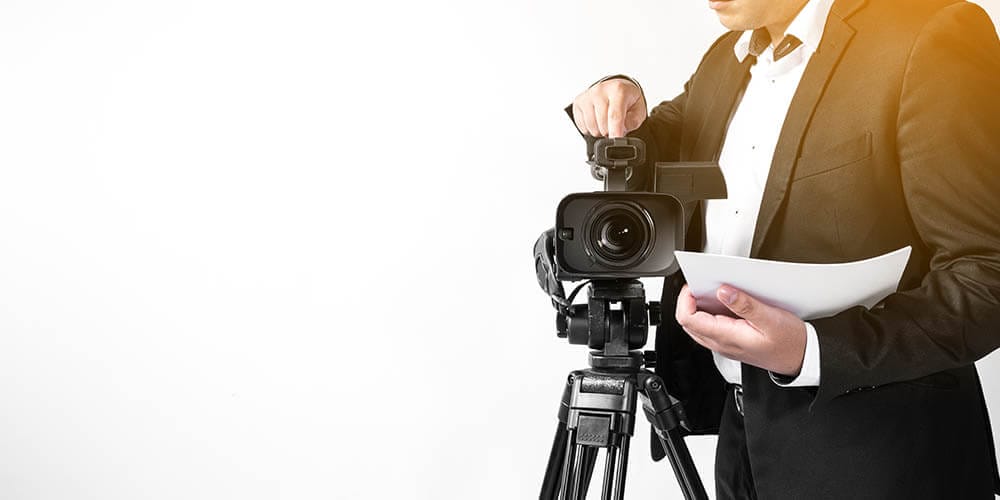The Function of Legal Videography in Depositions and Tests
Lawful videography has actually arised as an important tool in both depositions and tests, offering a multifaceted approach to documenting witness testimonies. As legal specialists significantly identify its worth, it prompts a much deeper examination of how these visual documents can influence juror assumptions and trial results.

Significance of Legal Videography
Lawful videography plays an essential function in the documentation and presentation of depositions and tests. This specific field integrates technological abilities with lawful knowledge to produce a dependable record of procedures that can considerably influence instance end results. The appearance of lawful videography boosts the understanding of witness statement, permitting jurors and courts to observe not only the spoken words but likewise the temperament, emotions, and body movement of the witnesses.
Additionally, legal videography supplies an objective account of events, reducing the potential for misconception that can occur with written records alone. This aesthetic documents functions as an important tool during test discussions, assisting in a clearer and more influential story for both plaintiffs and accuseds. The capability to replay video sectors throughout court procedures enables lawful groups to highlight key factors, strengthening their arguments properly.
The value of legal videography extends beyond the court room; it also plays a vital function in preserving proof for future reference, whether for allures or more lawful action. Thus, its combination right into the legal procedure is necessary for making sure a reasonable and exact representation of the realities, eventually adding to the pursuit of justice.

Refine of Legal Videography
While capturing the nuances of depositions and trials, the process of legal videography entails numerous essential steps that ensure premium, exact recordings. Initially, a specialist lawful videographer prepares by reviewing the instance products and understanding the specific requirements of the deposition or trial. This preparation consists of acquainting themselves with the individuals and the context, which assists in recording significant information.
On the day of the recording, the videographer establishes the essential tools, which typically consists of high-def electronic cameras, microphones, and correct lighting. Making certain optimum angles and audio high quality is vital, as it directly affects the efficiency of the recording. The videographer communicates with attorneys and individuals to establish protocols, ensuring that every person recognizes the recording process.
During the deposition or test, the videographer diligently videotapes the proceedings, paying attention to both spoken and non-verbal signs. This includes capturing the demeanor and responses of witnesses and attorneys. After the session concludes, the videographer might modify the footage for quality and conformity with legal criteria, creating an end product that precisely reflects the process for future recommendation and use in lawful contexts.
Benefits in Depositions
The incorporation of videography in depositions uses various advantages that enhance the total process of collecting evidence. One primary benefit is the capacity to capture witness statements with visual and acoustic fidelity, supplying a more precise representation of the witness's temperament, tone, and body movement. This multidimensional technique permits lawyers and courts to examine reliability better than typical written transcripts alone.
In addition, videographed depositions function as an effective tool for protecting statement. Needs to a witness become not available for test, their recorded deposition can be played in court, making sure that their evidence stays obtainable and relevant. This aspect significantly lowers the risk of losing critical information that might influence instance end results.

Finally, videography enhances the overall professionalism and reliability of the deposition process, this website instilling confidence in clients regarding the thoroughness of their legal depiction (legal videography). By leveraging modern technology, lawful professionals can substantially enhance the efficiency of depositions
Influence On Trials
In many tests, the combination of videography can considerably influence the presentation of evidence and the jury's assumption. Lawful videography catches witness testimonies and critical proof in a dynamic format, permitting jurors to involve with the product on numerous levels. This aesthetic element enhances the narration element of a trial, giving context and emotional vibration that conventional text-based proof might lack.
In addition, video recordings can work as effective tools for impeachment throughout cross-examination. When disparities arise in between a witness's prior declarations and their courtroom statement, video clip proof supplies an objective referral that can sway jurors' point of views. This immediacy and clearness can strengthen the reliability of a party's story while concurrently undermining opposing disagreements.

Future Trends in Legal Videography
As we look towards the future of lawful videography, a number of arising patterns promise to reshape its duty within the court room. One significant trend is the integration of expert system (AI) in video evaluation and modifying. AI can simplify the procedure of determining crucial moments in tape-recorded depositions, allowing attorneys to promptly access pertinent web content, consequently boosting performance in situation preparation.
Additionally, the surge of online truth (VR) and boosted fact (AR) innovations is expected to transform how jurors experience proof. legal videography. By submersing jurors in a simulated setting, these modern technologies can supply a more extensive understanding of complicated scenarios, leading to even more educated deliberations
Moreover, the boosting demand for remote depositions, increased by the COVID-19 pandemic, will likely proceed. Legal videographers will certainly need to adjust to new software and systems to make sure top notch recordings in virtual setups.
Lastly, the expanding emphasis on information safety will demand stricter protocols for saving and sharing video proof. As the lawful landscape progresses, lawful videographers need to remain abreast of these patterns to keep their significance and performance in the judicial procedure.
Final Thought
In summary, legal videography serves a vital function in the judicial process, enhancing the integrity of depositions and trials. By recording the subtleties of Read More Here witness testaments, this medium not only protects vital proof however also aids in providing information effectively to jurors. The relevance of visual paperwork in reviewing integrity and assisting in cross-examination can not be overstated. As modern technology proceeds to develop, legal videography is positioned to more transform its role within the legal landscape.